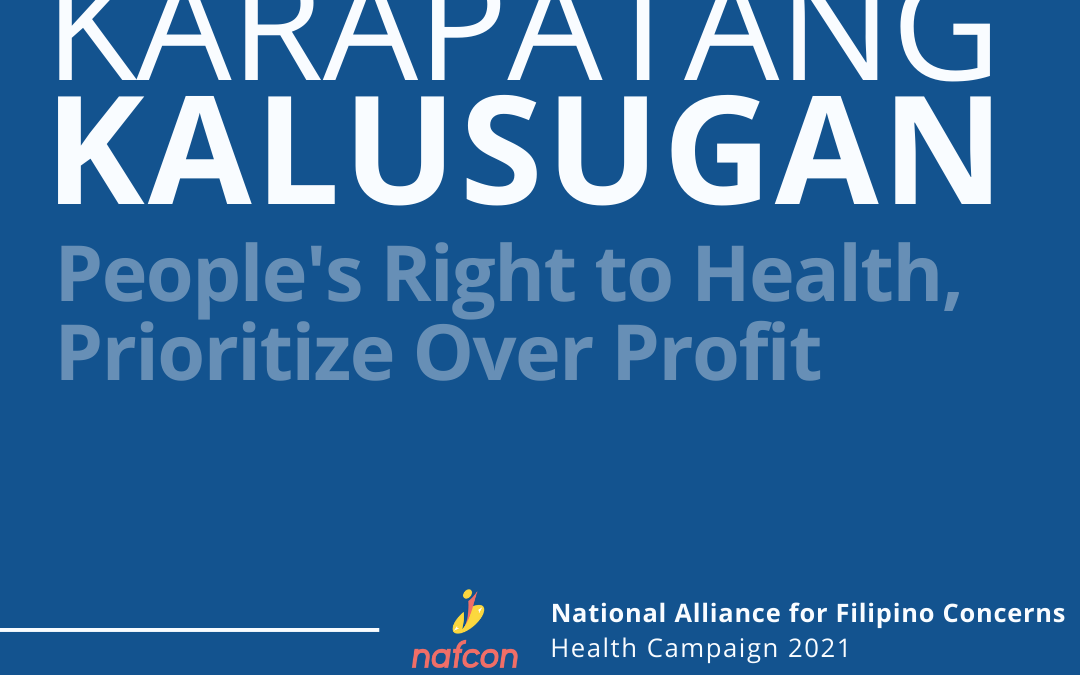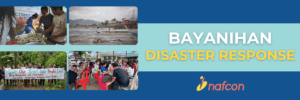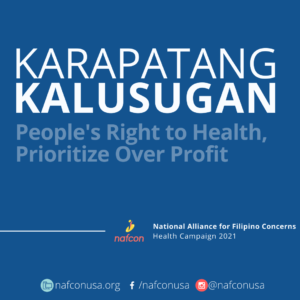For over a year we have been facing this pandemic, but we would be remiss if we don’t acknowledge, face, and collectively overcome a greater threat, and that is the epidemic of government corruption, inaction, and negligence. It is in this light that we launch this campaign, Karapatang Kalusugan at Kabuhayan (People’s Right to Health & Livelihood): Prioritize Health Over Profits, with the following objectives in order to continue uniting and taking actions while demanding accountability.
Karapatang Kalusugan at Kabuhayan (People’s Right to Health & Livelihood): Prioritize Health Over Profits
Background and Context
In the Philippines, Amid a historically ailing health system, the advent of COVID-19 pandemic further revealed the gaping and grave weaknesses of a fragmented system, with many people, the poor mostly, struggling to avail even the most basic of health services. Health financing was brought to its knees by the perennial problems of corruption, especially in the Philippine Health Insurance Corporation (PhilHealth), and the high out-of-pocket spending. Even the funds supposedly intended for the COVID-19 pandemic were not spared as PhilHealth officials, as revealed in the recent Congress hearings, used the health crisis to steal billions of pesos through the “Interim Reimbursement Mechanism” scheme. In August 2021, The Commission on Audit (COA) found that $1.3 billion of pandemic funds were either released with no proper documentation or misused citing prioritization of contracts for overpriced PPEs which were not available to the community and $237 million which should have covered hazard pay for frontline workers that went unused.
Filipinos still die of preventable and curable diseases, six (6) out of ten (10) deaths are not medically attended to by a physician, public health officer, hospital authority or other medical personnel, and household out-of-pocket expenses accounted for 53.9% of the total health expenditure. Meanwhile, those who care for the sick receive the lowest salaries which is why it is not surprising that the country remains one of the top exporters of doctors and nurses globally due to low wages, overwork, contractualization and inadequate benefits.
Meanwhile, ninety-nine (99) percent of Filipinos are not able to afford their prescription medicines as these are expensive. The current health system remains as it was decades ago: curative, specialist-oriented, urban-based, commercialized, doctor-centered, hospital-centric, Western-oriented and fragmented, thus unable to respond to the needs of the Filipino people, then and more so during this time of the pandemic.
In the United States, Despite being one the richest countries in the world, there is a stark contrast between the United States’ wealth, especially the top 1 percent who own over 30% of the country’s wealth, and the state of the health of its population.
The U.S. has adopted a mode of production that values profit over people and operates as a business, even in industries like healthcare. Though this country’s drive for profit may sometimes overlap with meeting the actual needs of the people, such as the case with providing public education, sustainable health and wellbeing was not built into its infrastructure.
“Filipino Americans have been highlighted in the media throughout the past year because, while they are 4 percent of registered nurses nationwide, they account for about 25 percent of registered nurses who have died of Covid-19, according to data the union National Nurses United had gathered as of May 28.”
Social determinants of health such as safe housing, transportation, racism, polluted air and water, among other factors, contribute to deep health inequity — these same factors became risk factors to contracting COVID-19. We saw that those who came from historically excluded communities, who also face financial instability/poverty and have a lower socioeconomic status, were at an increased risk for contracting the virus and death. Another compounding factor: these individuals are essential workers.
In the midst of a global pandemic, the U.S. government did little to support the people who keep this country operating on a day-to-day basis. In essence, the COVID-19 further exposed the deep social, political, and economic limitations of this country’s health infrastructure.
For over a year we have been facing this pandemic, but we would be remiss if we don’t acknowledge, face, and collectively overcome a greater threat, and that is the epidemic of government corruption, inaction, and negligence. It is in this light that we launch this campaign, Karapatang Kalusugan at Kabuhayan (People’s Right to Health & Livelihood): Prioritize Health Over Profits, with the following objectives in order to continue uniting and taking actions while demanding accountability.
Objectives for Campaign
- Promote the vision of a free, comprehensive, and progressive health care in the US and PH
- Enjoin the community to participate community discussions to deepen our understanding of current conditions in order to contribute moral and political support for communities in the US and PH
- Advance projects that support Community-Based Health programming in the US that services Filipinos and broaden the partnerships and collaboration
- Address the socio-economic and political factors affecting health and livelihood through advocacy in the US and PH
Components
Research and Education
-
- Virtual Tours with People’s Solidarity and Education Tours (PSET)
- Educational and Roundtable Discussions (continuation of Townhalls and Bi-lateral meetings, informed by examples below)
- Filipino Family Initiatives
- Impact Evaluation
Resource Mobilization
-
- Fundraisers
- Monetary
- Material
- Vaccine Access
- Food
- PPE
- Fundraisers
Service Provision
-
- Community Pantries (PH)
- Water Systems (PH)
- Community-Based Health Programs (PH/US)
- Medical Missions (US)
Action and Advocacy
-
- KAMTIN – Unity of Migrants and Advocates for Adequate Assistance (bit.ly/kamtinayuda)
- The Filipino American Agenda (FAA)
- People’s Health Agenda
- Philippine Human Rights Act (PHRA)
for more information email us at info@nafconusa.org



